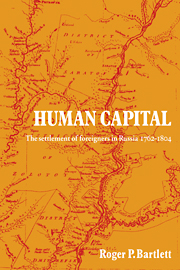Book contents
- Frontmatter
- Contents
- Weights and measures
- Abbreviations
- Preface
- Introduction
- I Antecedents
- 2 Catherine II and the Manifestos of 1762 and 1763
- 3 The response: settlement 1763–1775
- 4 Southern Russia 1764—1796
- 5 Urban and entrepreneurial settlement under the 1763 Manifesto
- 6 Immigration and colonies 1797–1804
- Conclusion
- Appendices
- Notes
- Bibliography
- Index
- Frontmatter
- Contents
- Weights and measures
- Abbreviations
- Preface
- Introduction
- I Antecedents
- 2 Catherine II and the Manifestos of 1762 and 1763
- 3 The response: settlement 1763–1775
- 4 Southern Russia 1764—1796
- 5 Urban and entrepreneurial settlement under the 1763 Manifesto
- 6 Immigration and colonies 1797–1804
- Conclusion
- Appendices
- Notes
- Bibliography
- Index
Summary
In the eighteenth century, Russia appeared to many people as a land of promise. Immigration both from the west and from the south – principally the Balkans and Transcaucasia – took place on a considerable scale, and involved a variety of nationalities and social classes. Among the many and varied foreigners who entered Russia at this time, the present study is concerned with one basic category: those who settled in the Russian Empire in response to the Imperial Manifestos of Catherine II, published in 1762 and 1763, and subsequent similar legislation.
Catherine's invitation to foreigners to settle in her domains formed the starting point of a long process. The Manifestos of 1762 and 1763 laid the foundation for compact settlements of foreigners on the Volga and in the southern Ukraine, as well as for small groupings elsewhere, during the eighteenth century; and although in 1804 the government of Alexander I set new conditions for the extensive European immigration into southern Russia of the early nineteenth century, Catherine's legislation was influential here as well. The year 1804 has been taken as the terminal date of the present study, but in one form or another the foreign immigration and settlement inaugurated in the 1760s continued through much of the nineteenth century.
The foreign colonies which resulted from the Russian immigration programme provoked controversy from the outset, and their history, and the attitudes of the authorities towards them, have been chequered.
- Type
- Chapter
- Information
- Human CapitalThe Settlement of Foreigners in Russia 1762–1804, pp. xiii - xviPublisher: Cambridge University PressPrint publication year: 1979



